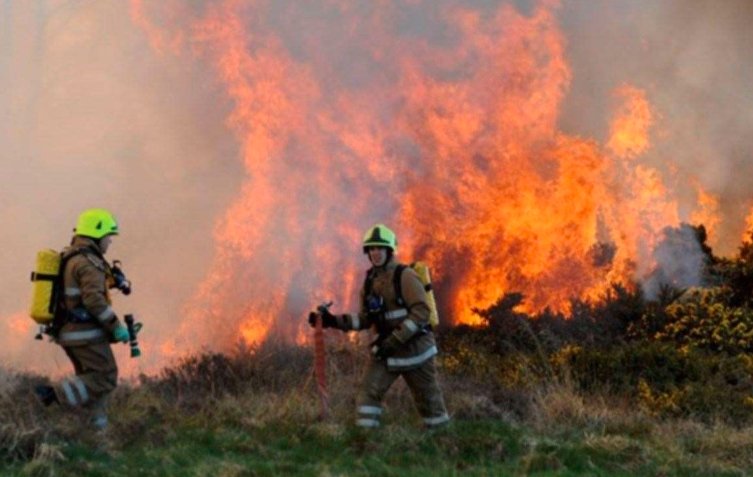Fire crews in the Scottish Highlands are battling relentless wildfires for a third straight day — a crisis some locals are calling the worst in living memory.
Blazes Stretch Firefighters to the Limit
Early Saturday morning, crews rushed to tackle a fast-spreading fire near Carrbridge. By Monday evening, the Scottish Fire and Rescue Service (SFRS) said multiple wildfire incidents were still raging across the region.
A spokesperson put it bluntly: “Our firefighters continue to work tirelessly to tackle several wildfire incidents from Carrbridge in Highland to Dallas, outside Forres in Moray.”
They urged locals to keep doors and windows closed to stop thick smoke from seeping indoors.
One short line: It’s grim, and it’s far from over.
The Scottish Gamekeepers Association (SGA), which joined frontline efforts, said it’s becoming “a danger to human life.” They warned the scale means firefighters can’t always reach other emergencies.

Locals Face ‘Worst in Our History’
Fergus Ewing, MSP for Inverness and Nairn, didn’t mince words. He said the wildfires “raging” through the Highlands are “the worst in our history” according to many residents.
He’s pushing for the Scottish government to convene its emergency response committee — the Scottish Government Resilience Room (SGORR).
First Minister John Swinney, posting on X, called the fires “extremely serious” and urged people to follow official safety advice. He also thanked firefighters and volunteers: “Grateful to Scottish Fire and Rescue Service and local people for their efforts.”
Rain on the Horizon, but No Guarantees
Scotland’s Environment Protection Agency (SEPA) issued flood alerts for parts of Moray and Highland on Monday. Heavy rain could help quash some flames — but it could also spark travel disruption and minor flooding.
A single line here: So it’s a double-edged sword.
One gamekeeper near Carrbridge said the last thing they want is more chaos. “This land is so dry, it’s like walking on paper. A sudden downpour? We’ll take it, but it might be too late for some wildlife.”
Campfire Blamed for One Blaze
For some, the wildfires feel like a nightmare with a preventable cause.
A witness told BBC Scotland the source of the Carrbridge fire was a ring of stones — the remnants of a campfire. Camping chairs were abandoned nearby.
Dræyk van der Hørn, a Scottish Greens councillor for Moray, photographed one of the fires from a Cairngorms summit.
He didn’t hold back: “Wildfires in Scotland were once a rarity. Not any more. Hotter, drier springs and summers – driven by the accelerating climate crisis – are turning our landscapes into tinderboxes.”
The Numbers Behind the Flames
So, how does this wildfire wave compare to past Scottish summers?
| Year | Wildfires Reported | Major Response Level | Climate Factor |
|---|---|---|---|
| 2019 | 32 | Moderate | Warm spring |
| 2022 | 48 | High | Record heat |
| 2025 | 57 (so far) | Extreme | Dry spring, heat spikes |
A line here: The trend is clear — more fires, more intensity, more danger.
Gamekeepers Say Bigger Blazes Averted
In the middle of the Highlands, it was nearly worse. The SGA credits a “round-the-clock effort” by gamekeepers and land managers who worked alongside fire crews.
Their push kept two separate fires from merging into what they called a “nightmare scenario.”
SGA’s spokesperson added, “We need to have the Scottish government and their advisers out now to see what is happening, while these fires are ongoing.”
How Locals Are Coping
Communities near Carrbridge, Forres, and Moray are on edge. Residents have scrambled to seal windows and check on vulnerable neighbours.
One local shop owner said her store has turned into an impromptu relief station. “People are dropping off bottled water for firefighters. We’re collecting sandwiches, flasks of tea, whatever we can.”
Meanwhile, the Scottish Fire and Rescue Service says every available hand is needed to cover:
-
Ongoing wildfires from the Highlands to Moray
-
Support calls for rural communities
-
Evacuation readiness for worst-case flare-ups
Climate Crisis on Scotland’s Doorstep
It’s not just about this week’s flames. For Dræyk van der Hørn and other climate campaigners, these fires are a brutal reality check.
“Climate change is here,” he said flatly. “Moray and Scotland are on the frontline. Fires are now more frequent, more intense and more destructive. This is not a distant warning.”
One gamekeeper said if these conditions become the norm, Scotland’s firefighting resources — already stretched thin — need a major rethink.
One line: “Next time,” he said, “it could be a village.”


















